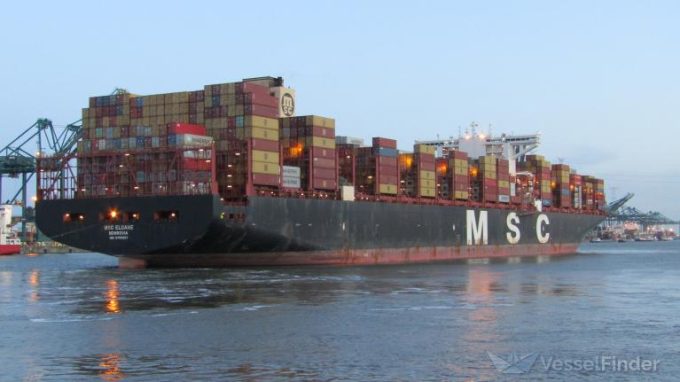Grape demand: carriers line up for a bite as South African export season begins
South Africa’s grape export season has begun, and ocean carriers are lining up for a ...
BA: WIND OF CHANGEMAERSK: BULLISH CALLXPO: HEDGE FUNDS ENGINEF: CHOPPING BOARDWTC: NEW RECORDZIM: BALANCE SHEET IN CHECKZIM: SURGING TGT: INVENTORY WATCHTGT: BIG EARNINGS MISSWMT: GENERAL MERCHANDISEWMT: AUTOMATIONWMT: MARGINS AND INVENTORYWMT: ECOMM LOSSESWMT: ECOMM BOOMWMT: RESILIENCEWMT: INVENTORY WATCH
BA: WIND OF CHANGEMAERSK: BULLISH CALLXPO: HEDGE FUNDS ENGINEF: CHOPPING BOARDWTC: NEW RECORDZIM: BALANCE SHEET IN CHECKZIM: SURGING TGT: INVENTORY WATCHTGT: BIG EARNINGS MISSWMT: GENERAL MERCHANDISEWMT: AUTOMATIONWMT: MARGINS AND INVENTORYWMT: ECOMM LOSSESWMT: ECOMM BOOMWMT: RESILIENCEWMT: INVENTORY WATCH

Congestion around Singapore port has delayed the relaunch of MSC’s standalone Mustang transpacific express service.
Mustang’s commencement was pushed back from Sunday to next Thursday (18 July) after the first ship in the line-up, the 19,462 teu MSC Eloane, was delayed and unable to arrive in Yantian on time.
The service, with a rotation of Yantian-Ningbo-Shanghai-Long Beach, had already been postponed from its scheduled launch date of 8 July, as MSC wanted to replace the 16,616 teu MSC Lella with the larger MSC Eloane.
Mustang was first launched in October 2021, but was pulled in June 2022 when the pandemic-induced boom faded. Now, with freight rates surging once more, MSC is relaunching it.
EconDB’s vessel-tracking data shows MSC Eloane, which is being redeployed from the 2M Asia-North Europe Griffin service (which Maersk labels the AE55 sweeper), arrived in Singapore on 7 July for bunkering. It is now expected to arrive in China’s Xiamen port on Saturday. Besides MSC Eloane, five other ships of 8,000 to 19,000 teu will be deployed to Mustang.
Bottlenecks at the world’s largest transhipment hub appear to have returned over the past week, with ships waiting up to three days to berth in Singapore.
EconDB data now shows outbound containers have a dwell time of nearly 13 days, up from 10 days last week, while the dwell time for transhipped containers remains unchanged, at 10 days.
However, PSA today claimed the “average wait time at the port in recent weeks has been reduced to two days or less”, and said it was continuing to work with carriers, and reiterated comments from Singapore’s transport minister, Chee Hong Tat, last week, who told the city state’s parliament that 90% of the incoming box ships were arriving late.
This compared with 77% in 2023, PSA added today, while vessel port stays at Singapore increased 22% year on year, “due to more containers being handled per vessel call due to higher demand and container re-handling, where some containers are unloaded from the vessel to make way for other containers in consideration of port of discharge, weight and vessel stability”, with unloaded containers then loaded back onto the vessel.
PSA CEO Ong Kim Pong said: “The Red Sea crisis has significantly disrupted global shipping and trade, and we anticipate this challenging situation to persist for a prolonged period, potentially extending port congestion from Asia to Europe.
“PSA is building partnerships with like-minded customers and stakeholders on a series of Node-to-Network initiatives to better coordinate between upstream and downstream ports so as to uplift shipping schedule reliability and overall network efficiency.”
Comment on this article